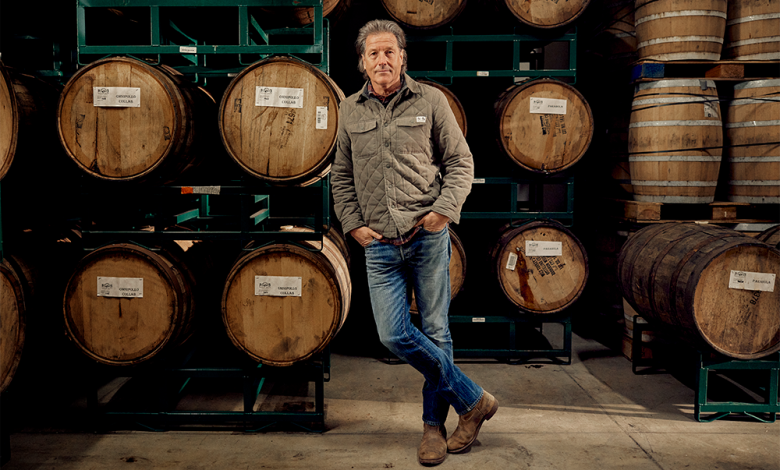

Conditions are tougher for craft breweries than at any point during my 17 years of covering the beer industry. From a global pandemic to an incredibly crowded marketplace, changing consumer preferences to the emergence of alternative alcoholic beverages, inflation to increased cost of goods, labor and everything else, breweries seemingly have the deck stacked against them. Which makes it all the more impressive that they not only soldier on, but innovate in between the countless pivots required to keep their businesses afloat, their people paid and their patrons satisfied. That tenacity and passion is inspired. So, too, is the faith in not only the brewing profession, but beer itself, which is exhibited by so many within the industry. One of those individuals is David Walker, the co-founder of 28-year-old Firestone Walker Brewing. Recently, I was part of a media contingent Walker guided through an extensive tour of the company’s headquarters in Paso Robles, California. In addition to detailing recent upgrades and forthcoming initiatives, he opined about the state of the industry and his business’ place within it. While openly acknowledging current challenges, he was bullish on beer as a beverage, sharing myriad opinions about its global significance and why he is convinced it will maintain a place – and a prominent one at that – in peoples’ hearts and on their tables. It was uplifting hearing someone of Walker’s pedigree, an industry entrepreneur with roughly three decades of hindsight-informed perspective, express such hope. Feeling San Diego Beer News readers may appreciate hearing what he had to say, I reached out to Walker to see if I could interview him about his views and speculations regarding beer and its longevity. His reply: “I’m in…I’m a believer.”
What is craft beer, how has the industry changed over time, and how has your team adapted as the market shifts to favor smaller brewing operations?
Craft beer is beer, elevated, emphasized, carefully constructed and obsessed over. Craft brewers have been most impactful as small-batch, fresh, innovative artisans. The sweet spot lies in the fresh, local and interesting…areas where it’s hard for large industrial brewers, vintners and distillers to compete. This dynamic will always create a playing field for energetic, bright, new entrants looking to live their passion through their work in the communities they live in. This is a positive dynamic.
That said, like many things, there is real compromise the larger you become – creative guard rails, diminished business margins, the burden of a capital-intensive enterprise. It’s a different riddle the bigger you get. One way we’ve taken this on at Firestone Walker is by doubling down on artisanal pursuits as we’ve grown larger. We built a hotrod R&D brewhouse in Venice that produces interesting small-batch beers and experimental brews. We created a beer club that opened up a new channel for our rare barrel-aged beers. We also have the Barrelworks cellar that produces esoteric micro-batch wild ales. These are all things that keep the roots deep and fresh.
Going forward, outsized growth of individual brewers will be less prevalent as the sheer number of smaller brewery models shares the available consumers seeking a craft beer.
Is the current chapter in the American craft-beer story more about playing it safe, innovating or something else?
Craft changed the world of beer, and in doing so blurred the lines between all brewers and gave rise to unbridled innovation. It challenged the monolithic perceptions based around beer, changing consumers’ and retailers’ perceptions of what it is…especially consumers. That has created a boisterous marketplace, but I see this current environment as the cut and thrust of anything in this day and age – fast-moving, fragmented, highly complex, etc. The main strategy is “be engaged”.
Do you think there will be another craft-beer boom at some point down the road?
I think craft beer is fully formed. There is no vacuum in which a “boom” can be recreated. The fundamentals of beer are hard to argue, likewise the honesty and beauty of the proprietary artisan doing something in a unique way are hard to ignore. Thousands of breweries across the U.S. have proven this and millions of consumers have been enchanted. Brewing enterprises will come and go as their owners lose steam or stumble, but the reasons for brewers and beers remain.
What about beer’s role throughout history and your lengthy tenure in the industry strengthens your confidence that it will endure?
One could argue beer is the original social lubricant, the thing that tempered us and let us dream and collaborate. Without question there are scores of other devices we have pursued, but beer is the most reliable, ubiquitous and affordable. Its production is not constrained by climate and time like wine, and its lower ABV (alcohol-by-volume) makes it a casual choice when set next to distilled spirits. For me, the fundamental logic of its endurance is profound. When you wrap this in the provenance and tradition of millennia, it’s hard to bet against it.
I believe in beer, but the way brewers act and the beers they make will change depending on consumers’ demand and the folks helming those enterprises. Macro forces like pandemics, economies, politics and social trends will influence those brewers. Does it change our passion for beer or its fundamental qualities? I don’t think so. When we started our brewery, the challenges to the notion were overwhelming – regulation, supply chain, route to market, severe indifference to beer by the consumer. It was an endless list of obstacles. We and thousands of small brewers changed that with passion. I am not worried. There are a lot of passionate folks engaged in our world.

